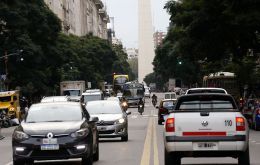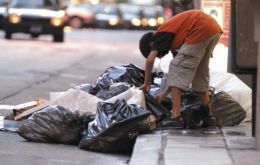MercoPress. South Atlantic News Agency
Tag: Indec
-
Saturday, July 13th 2024 - 10:22 UTC
Argentina tops list of LatAm countries with the highest inflation for the 9th straight month

Argentina was found to boast the dubious honor of topping the list of Latin American countries with the highest inflation for the ninth month in a row after Friday's release by the National Institute of Statistics and Census (Indec) of the latest report regarding June's figures. The CPI went up 4.6% while all the other countries recorded variations below one digit.
-
Friday, June 14th 2024 - 09:30 UTC
Argentina's Indec says May's CPI reached 4.2%

Argentina's National Institute of Statistics and Census (Indec) announced Thursday that the Consumer Price Index (CPI) had grown 4.2% in May, which was celebrated by the Libertarian administration of President Javier Milei as another sign of a slow victory over inflation despite the 71.9% recorded in the first five months of 2024 and the 276.4% yoy.
-
Tuesday, May 14th 2024 - 23:05 UTC
Argentina: Inflation keeps decelerating in April

Argentina's National Institute of Statistics and Census (Indec) Tuesday announced that April's Consumer Price Index (CPI) stood “at 8.8% in April 2024 compared to March and 289.4% year-on-year.” The government agency also noted in its X account that “they accumulated an increase of 65% in the first quarter.”
-
Thursday, May 2nd 2024 - 19:11 UTC
Argentina: Drop in retail prices expected soon

In line with President Javier Milei's chainsaw politics to curb inflation, Argentine supermarkets expect a drop in retail prices shortly once imported items arrive to compete with local production as agreed upon with the Economy Ministry in March, it was reported in Buenos Aires.
-
Friday, April 12th 2024 - 21:40 UTC
Argentina: Inflation in March reaches 11%

According to a report released Friday in Buenos Aires by Argentina's National Institute of Statistics and Census (Indec), the Consumer Price Index (CPI) in March in the South American country went up 11% for an interannual total of 287.9%. The new figure represented a 2.2% decrease from February but a 51.6% growth in the first quarter of 2024.
-
Friday, January 12th 2024 - 10:34 UTC
CPI goes up 25.5% in December in Argentina

Argentina's National Institute of Statistics and Census (Indec) Thursday said the Consumer Price Index (CPI) for December 2023 went up by 25.5% for an interannual total of 211.4%, it was reported in Buenos Aires.
-
Wednesday, August 16th 2023 - 11:48 UTC
Argentina: July's inflation reported at 6.3%

Argentina's National Institute of Statistics and Census (Indec) announced Tuesday that the variation in the Consumer Price Index (CPI) for the month of July of 2023 was 6.3% for a total of 60.2% in the first seven months of the year and 113.4% interannually, it was reported in Buenos Aires.
-
Wednesday, February 1st 2023 - 10:42 UTC
Census shows Argentina has a population of 46 million

Argentina's National Institute of Statistics and Census (Indec) Tuesday published the results of the 2022 survey, which showed that the country has 46,044,703 inhabitants in 17,805,711 households nationwide. The study also found that 48.22% of the total population was male and 51.76% female.
-
Wednesday, November 16th 2022 - 10:18 UTC
Indec says Argentina's inflation for October reached 6.3%

Argentina's inflation reached 6.3% in October for an 88% interannual result, according to the latest report from the National Institute of Statistics and Census (Indec). According to current projections, it may reach 100% by the end of the year.
-
Thursday, October 6th 2022 - 10:38 UTC
Argentines striving between childhood poverty and indigence, CFK's favorite economist pointed out

Following last week's figures from Argentina's National Institute of Statistics and Census (Indec) pointing out that 50% of the country's children under 15 lived in poverty, researcher Agustín Salvia said the data were “in line with what was expected.”
